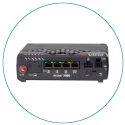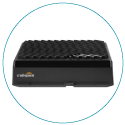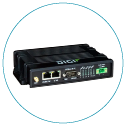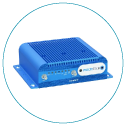Cradlepoint Case Study | Cloud-Managed Edge Routers for Public Transit
Seattle Transit Agency Welcomes Aboard Reliable LTE for In-Vehicle Systems
Cloud-managed wireless edge routers keep AVL data, payment systems, and other technologies seamlessly connected in public buses
Case Background
King County Metro is the largest public transportation agency in Washington, serving more than 2.25 million people across the cities of Seattle, Redmond, and Bellevue. Each year King County Metro delivers more than 130 million rides through a variety of mobility options, a part of which includes fixed-route bus services composed of more than 1,750 metro buses.
Challenges Faced
With wireless hardware in its buses approaching end-of-life support, Seattle-based King County Metro needed a new and scalable solution for in-vehicle connectivity. Having used often spotty networks with frequent dropped connections, it was difficult to reliably use real-time GPS and Auto Vehicle Location (AVL) data and other critical operational technologies. Without a cloud-based network management platform, keeping up with installations, firmware updates, and troubleshooting was not feasible for the agency’s lean IT team.
Solutions Delivered
The agency upgraded its metro buses and select bus stops with a comprehensive solution: Cradlepoint’s NetCloud Service for Mobile and wireless LTE routers, designed specifically for the unique needs of a vehicle — including routing, GPS, AVL integration, and centralized network management.
Benefits Experienced
With highly pervasive LTE connectivity throughout the Puget Sound region, King County Metro can utilize real-time data gathered from a wide range of sensors and devices. These analytics power greater operational efficiency, provide the IT team with cloud-based management tools, and improve the passenger experience.

Challenge Detail
For an agency driven by the ideal that “Mobility is a human right,” providing anything less than industry-leading service has never been an option. For metro bus connectivity, King County Metro had been using licensed 4.9 GHz network connections — an under-utilized public safety band set aside by the FCC 20 years ago — with equipment that was approaching end-of-life support.
Administrators recognized the need to implement a new, more scalable wireless networking solution to address some key challenges.
“When we upgraded, we looked at either rebuilding the infrastructure with our private Wi-Fi throughout the city and at the bases or moving to LTE. We went with cellular,” said Russ Mattichak, a network engineer for King County Metro.
Unreliable connections preventing real-time data
Riders had come to expect real-time metro bus location updates, arrival times, and trip planning capabilities, delivered via the website, phone apps and digital signs, and located on the vehicles and at bus stops. Without a continuous network connection, it was impossible to use GPS data and AVL systems to meet rider expectations.
Other technologies that require constant in-vehicle connectivity include traffic signal priority radios and the fare payment system, which uses prepaid cards.
Without the ability to connect to the network, the system cannot receive or transmit updates about changes to the balance on those cards.
Complexity of fleetwide network management
With hundreds of buses, equipment needed to be physically installed and, once connected to the network, managed by the agency’s lean IT department. This presented a serious logistical challenge: one that would be significantly more complex without a cloud-based central management tool.
Agility necessary for consistent growth
Public transit constantly evolves to fit a population’s needs. Looking to the future, this means moving new and existing buses to additional routes to serve growing neighborhoods and municipalities. The agency also needed a solution that could scale over time to maintain compatibility with, and take advantage of, the latest networking technologies.
Solution Detail
For more than 1,700 metro buses, King County Metro chose to utilize easily accessible and near ubiquitous cellular networks for building a new wireless infrastructure. The agency standardized on Cradlepoint’s NetCloud Service for Mobile and ruggedized IBR1700 wireless LTE routers to keep on-board devices and applications connected, and to enable the IT team to monitor data security and manage and troubleshoot the network from anywhere.
Upgrade your IBR1700 routers with Cradlepoint’s new 5G-capable MC400 modular modems to give your public transit the best in mobile connectivity.
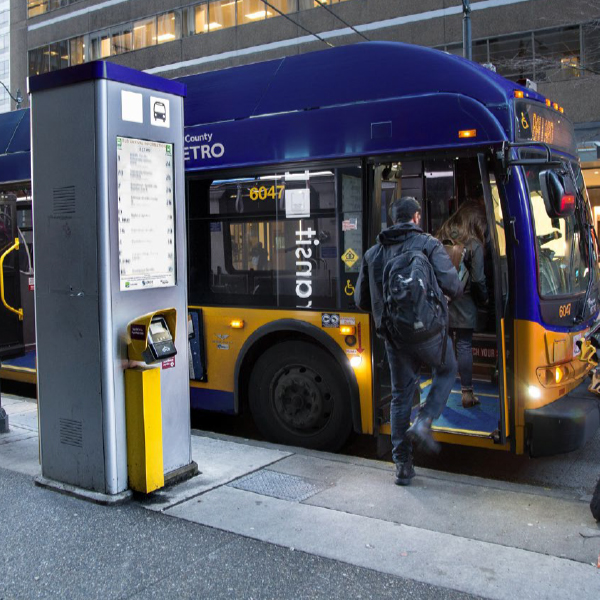
“NetCloud Manager and the web portal was a big, big piece of why we went with Cradlepoint,” Mattichak said.
Benefits
Real-time operational data
With Cradlepoint’s NetCloud Manager (NCM) delivering AVL, GPS, and cellular health information to critical applications — data that is mandatory for measuring success — the agency gains access to actionable insights for improving fleet operations and infrastructure.
Constant connectivity upgrades rider satisfaction
Wherever Seattle-area metro buses travel throughout the Puget Sound region, reliable LTE connectivity supports the applications and devices needed to operate smoothly. Rider experience is optimized and maintained with the knowledge that all digitally posted arrival times are accurate and trustworthy.
Additionally, passengers enjoy quick and easy fare payment using their prepaid cards by simply tapping the card reader when boarding — a system that relies on seamless network connectivity and helps keep buses on schedule.
Centralized network monitoring, management & troubleshooting
NCM enables centralized configurations and management — with point-and-click functionality for formerly tedious tasks such as firmware and info security updates.
“I can schedule updates to push out across the fleet simultaneously at 3 a.m. — without requiring our team to visit any of the buses,” Mattichak said.
NCM provides a single pane of glass through which the IT team can view easy-to-read connection and security dashboards for actionable insights, and to troubleshoot certain issues remotely instead of in person. This benefits the organization as a whole by increasing workforce efficiency and decreasing operational costs — freeing up resources that allow King County Metro to continue providing industry-leading public transit services.
“If there’s a connection outage or router issue, I can go into the cloud, get into the console, and figure out what’s going on,” Mattichak said.
Streamlined installation & setup
King County Metro can quickly add new in-vehicle connectivity through NCM, and by using Cradlepoint Verify, a mobile installation app that helps staff quickly and accurately assemble, set up, and begin using Cradlepoint routers.
Prepared to grow
With Cradlepoint’s Gigabit-Class LTE mobile routers featuring integrated Wi-Fi, ethernet and serial ports, and dual-modem capabilities, the agency is fully enabled to adopt new technologies, scale over time, and enhance operational efficiency and on-time service.
To complement the routers installed in coaches, strategic bus stops were upgraded with 150 IBR900 routers. These endpoints provide connectivity for digital signage that displays current bus arrival times, and for fare collection devices that download and upload payment information.

Contact USAT
USAT is an Elite Resale Partner of Cradlepoint. If your public transit agency needs a solution quickly, USAT has the equipment in stock and can provide rapid installation services. Our installation technicians are ready to install hot-spots into public and private buses quickly and expertly.
We have installation teams in Alabama, Florida, Tennessee, Georgia, North Carolina, South Carolina, Virginia, and some regions in Texas and Colorado. USAT has broadband, secure, WiFi hot-spots and high-powered antenna assemblies designed to cover broad areas, like parks, parking lots, bus stations, and bus stops.
Cradlepoint, the Cradlepoint logo, and NetCloud Logo design are trademarks of Cradlepoint. Other registered trademarks that appear on this brochure are the property of the respective owners. © 2020 Cradlepoint, Inc.
Share this Post


